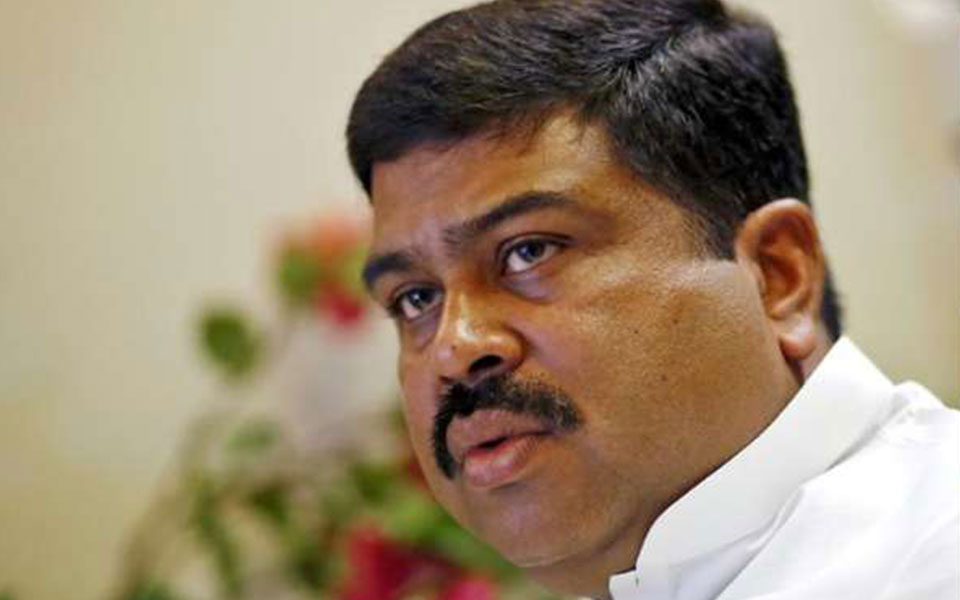New Delhi, June 6: Sternly ruling out any rollback of deregulation of fuel prices, Oil Minister Dharmendra Pradhan on Wednesday said despite having the burden of repaying oil bonds, the government will take full responsibility of keeping fuel prices in check and ensuring they don't go out of reach of the common man.
Addressing a press conference here, Pradhan reiterated that the government was working on a long-term solution to address oil price fluctuations while taking a holistic view of all factors.
He said there was a greater conducive environment to bring petroleum products under the Goods and Services Tax (GST), however adding that the GST Council would have to take a call on that.
"I stand by my statement: the government will take a holistic view. There are three major factors for oil price hike -- geopolitics leading to fluctuation in international crude oil prices, exchange rate fluctuation between dollar and Indian currency, and taxation structure of our country where some taxes are imposed by state governments and (Centre imposes) excise duty," Pradhan said.
"Taking into account all this and while ensuring that India's poor and middle classes do not have to bear the pinch (due to oil prices), the government will take all necessary steps."
Asked if as part of the "long-term plan" to deal with rising fuel prices, the government was considering partial rollback of deregulation, Pradhan said: "That question doesn't arise. It is a reformist government. We cannot go back on reforms."
The Minister said that while reduction in petrol and diesel prices had started, albeit due to international developments, the government is "sensitive and committed towards interests of poor and middle classes".
"No one can predict oil price fluctuations, but I assure (you) that taking into account all factors -- and despite there being some factors beyond our control -- the government will handle this issue with complete sensitivity and will take responsibility for it," he said.
Terming "unfair" the comparisons of fuel prices during the UPA regime -- when crude prices were skyrocketing -- with the current government, Pradhan said inflation was responsible for high prices.
"Inflation has increased significantly and that's why high fuel prices. But we will ensure the prices don't go so high that they get out of the reach of the poor and middle classes."
Referring to Former Finance Minister P. Chidambaram's comments that there was a room for cutting oil prices by as much as Rs 25 per litre, he said: "In the name of oil bonds (issued to oil companies for subsidising fuel), a huge burden has been left by the previous government on the current government. We never complained and are paying off those bonds."
About the possibility of bringing transportation fuel under the new indirect tax regime, the Minister said while GST is imposed on all the processes of the oil sector -- production, pipeline and refineries -- but there is no GST on the finished goods.
"Hence we are not able to realise it (claim input tax credit). That's why petroleum products should be brought under GST," he said, adding that the GST Council is responsible for the same.
"However, while interacting with Chief Ministers, I am getting more and more positive vibes and I feel that it will be brought under GST soon. The reservations related to the new tax regime are going away after its successful implementation," Pradhan said.
Let the Truth be known. If you read VB and like VB, please be a VB Supporter and Help us deliver the Truth to one and all.
Hyderabad (PTI): Telangana Chief Minister A Revanth Reddy met Union Home Minister Amit Shah in Delhi on Wednesday night and urged him to increase the sanctioned strength of IPS officers to the state in view of its growing administrative and security needs.
The two leaders also discussed the recent surrender of several senior Maoist leaders before the Telangana Police and other issues.
"During the meeting, the two leaders discussed the issue of Maoist surrenders and their rehabilitation. The chief minister informed Shah that significant improvements in policing have taken place in Telangana over the past two years," an official release here said.
Highlighting that 591 Maoists have laid down their arms and joined the mainstream of society during this period, the chief minister said the state government was providing them compensation and rehabilitation assistance as per the rules.
He requested the Union home minister to extend financial support from the central government for development works in the backward regions of the state.
Reddy also urged Shah to increase the sanctioned strength of IPS officers to the state from 83 to 105 in line with the state's growing administrative and security needs, the statement said.
The first cadre review after the formation of Telangana was conducted in 2016, while the next review, due in 2021, was delayed and finally carried out in 2025. Even then, only seven additional IPS officers were allocated to the state, the chief minister informed Shah and requested that the third cadre review be conducted in 2026 as per the schedule.
Reddy explained that Telangana, like the rest of the country, is facing several modern challenges, including cybercrime, drug trafficking, white-collar crimes, and other emerging security threats.
He highlighted the reorganisation of the Hyderabad, Cyberabad, and Malkajgiri Police Commissionerates, the proposed formation of the Future City Commissionerate and the rapidly growing population in Hyderabad to underline the increasing administrative requirements of the state.





